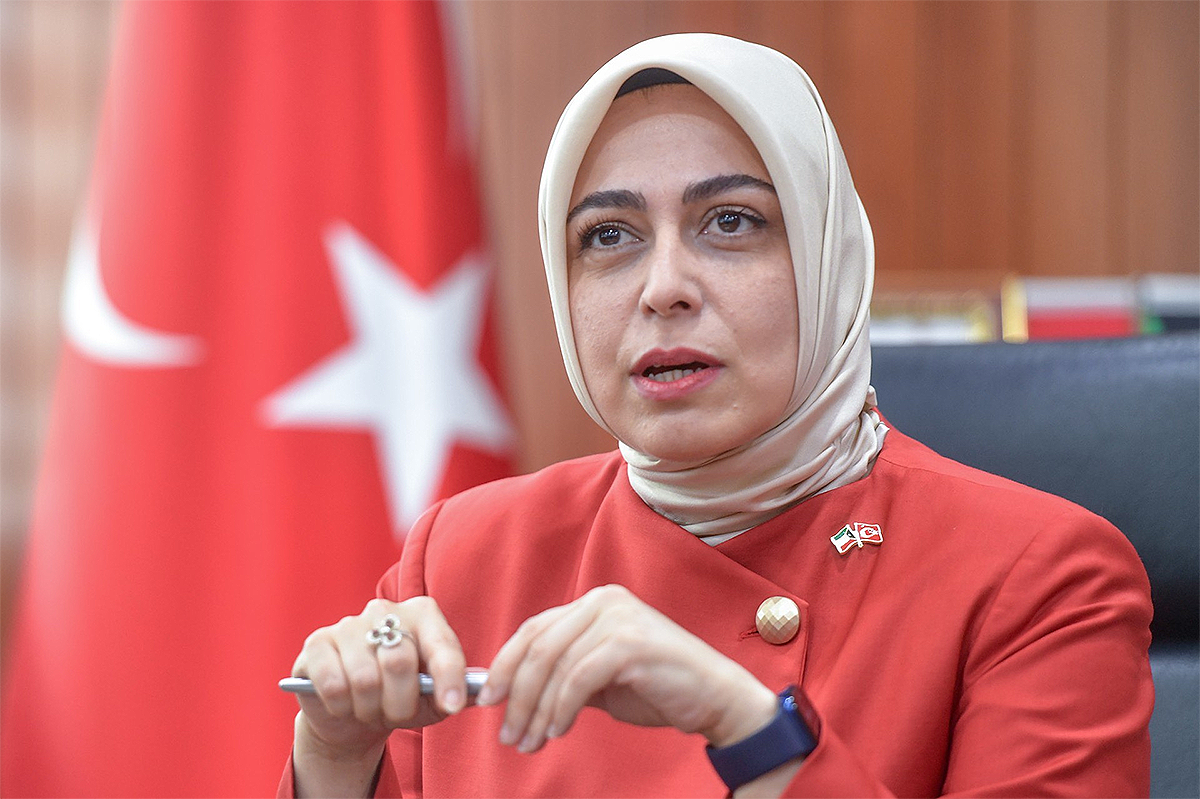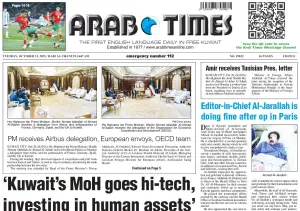20/10/2025
20/10/2025

Turkish Ambassador to Kuwait Tûba Nur Sönmez
KUWAIT CITY, Oct 20: Turkish Ambassador to Kuwait Tûba Nur Sönmez affirmed Monday that her country will continue to support Kuwait Vision 2035, led by His Highness the Amir Sheikh Meshal Al-Ahmad Al-Jaber Al-Sabah. In a press statement, Sönmez disclosed that Türkiye will cooperate in the fields of development, energy and infrastructure.
She said the upcoming visit of Turkish President Recep Tayyip Erdoğan will include discussions on developments in Palestine, Syria and elsewhere, enhancing joint cooperation, and maintaining peace and stability in the region. She added this visit is an opportunity to build on the momentum achieved during the visit of His Highness the Amir Sheikh Meshal Al-Ahmad Al-Jaber Al-Sabah to Turkiye last year, as several agreements and protocols in the fields of defense industries, energy, investment, transportation and trade, are scheduled to be signed to support bilateral relations and diversify investments. She stressed that Turkish-Kuwaiti relations are considered a model of bilateral relations, pointing out that the foundation of the two countries’ friendly relations is based on shared values, common interests, strong political will at the leadership level, and brotherly ties between the two peoples. She confirmed that Kuwait is one of most reliable partners of Türkiye in the Gulf region, and that cooperation between the two countries encompasses various fields, such as trade, defense, tourism and investment. She added that the growing political will of the two leaders -- His Highness the Amir Sheikh Meshal Al-Ahmad and President Recep Tayyip Erdoğan -- allows the development of relations on multiple fronts.
She pointed out that His Highness the Amir Sheikh Meshal’s visit to Turkiye last year was highly successful and resulted in the signing of six agreements in the fields of defense, trade, investment, diplomacy and culture, in addition to the establishment of a joint strategic dialogue mechanism, elevating relations to the level of strategic partnership. She indicated that the volume of trade exchange reached about $720 million in 2024, adding this figure does not reflect the true potential, and that both sides have the capacity to double it within a short period. She said more than 400 Kuwaiti companies operate in Türkiye in various fields, while around 50 Turkish companies are active in Kuwait, particularly in the construction sector, where Turkish companies play an important role in the implementation of infrastructure projects such as Terminal Two at Kuwait International Airport. Regarding bilateral cooperation, she stated that high-level visits contributed to diversifying bilateral relations, and that cooperation in the defense industry has gained significant momentum, thanks to these visits. She cited the reciprocal visits by the chiefs of staff and military delegations between the two countries, as well as the visit of the head of the Turkish Defense Industries Authority to Kuwait in November 2024.
She added that a delegation from the Turkish Ministry of Health visited Kuwait last May to discuss areas of health cooperation. She revealed that Kuwaiti investments in Türkiye have reached about $2 billion since 2002, stressing the need to increase this figure by strengthening cooperation between the sovereign wealth funds. She also disclosed that Türkiye received around 300,000 Kuwaiti tourists last year, and that the customs and traditions between the two peoples are similar. She expressed her happiness over the growing interest of Kuwaitis in learning the Turkish language and culture, unveiling a plan to open the Yunus Emre Cultural Center in Kuwait soon as a platform for cultural exchange. She affirmed that Türkiye and Kuwait share a common vision for maintaining peace and stability in the region, and that Kuwait is a key factor in achieving regional stability. She added the ninth round of political consultations will be held in April 2025 in Turkiye, while emphasizing the importance of ongoing consultation and cooperation between the two countries, especially in light of developments in Palestine and Syria and the tension between Iran and Israel.
By Fares Ghaleb Al-Seyassah/Arab Times Staff


